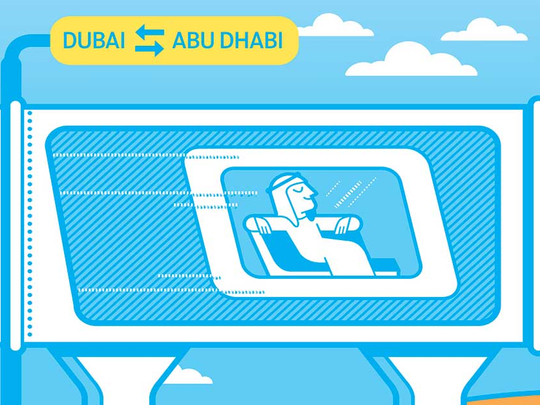
Hyperloop One’s announcement on November 8, 2016, at Burj Khalifa in Dubai was the biggest step yet towards the most dramatic transformation in the way people travel in the 21st century. It revealed that together, Dubai’s Roads and Transport Authority (RTA) and Hyperloop One were actively exploring a link between Abu Dhabi and Dubai — taking the hyperloop from a pipe dream to a commercial reality.
That reality will redefine the future of mobility: A system of autonomous vehicles, capable of taking people hundreds of kilometres in a matter of minutes in a living room environment. Abu Dhabi to Dubai in 12 minutes; Dubai to Riyadh in 48 minutes. That reality will redefine the way we live, work and connect.
Hyperloop can be explained as a low-pressure tube through which levitating pods containing both passengers and goods can travel at up to 1,200 km/hr — and it has recently gained attention around the world. Benefits include higher standards of safety than a passenger jet, lower build and maintenance costs than high-speed rail and energy usage, per person, that is similar to a bicycle.
In less than two years, Hyperloop One has raised more than $160 million (Dh588.48 million), assembled a team of more than 200 world-class experts, built a campus in Downtown Los Angeles, a test and safety site in the Nevada desert and a 10,000-square metre machine and tooling shop north of Las Vegas. In September, Hyperloop One was honoured to be invited to participate in Dubai Future Accelerators, a unique programme that seeks to change the world by connecting people and making their lives easier.
This programme culminated in Hyperloop One signing a Memorandum of Understanding with RTA to evaluate the high-level feasibility of a passenger hyperloop connecting Dubai and Abu Dhabi. In the months after the announcement, we have worked with McKinsey and the Bjarke Ingels Group (Big) in a 12-week engagement, sponsored and paid for by RTA.
With this landmark agreement, RTA has become Hyperloop One’s first customer and likely makes the UAE the first location globally for a Hyperloop system, signifying the UAE’s transformation from a technology consumer to a technology creator, while simultaneously positioning the country at the forefront of transportation technology and innovation.
As Rob Lloyd, CEO of Hyperloop One, said: “Having signed an agreement with DP World in August to pursue a cargo-based Hyperloop One system at Jebel Ali port, our focus has now expanded to include connecting the emirates. As the central global transport hub, pursuing the implementation of a Hyperloop in the UAE makes sense. The leaders of the UAE understand that transportation is the new broadband, with the power to transform life throughout the GCC [Gulf Cooperation Council].”
He continued: “We are now at a stage where, from a technological point of view, we could have a Hyperloop One system built in the UAE in the next five years. Our agreement with the RTA is the biggest step yet towards achieving this goal.”
Alongside the signing of the agreement with RTA, Hyperloop One has now also introduced, for the first time ever, a vision that represents a complete transformation in the way people travel in the 21st century as the engineers, architects and designers from Hyperloop One and Big have collaborated intensively for six months to produce a wholly original system design for hyperloop travel.
Going one step further to showcase the Hyperloop One customer experience, we additionally revealed the first-ever physical routes from Abu Dhabi to Dubai, several Hyper-ports (the equivalent of a station or airport) throughout Dubai, and the conceptual interiors and exteriors of the individual passenger pods. The work was based on a detailed study of how an urban and inter-city transport network should integrate with the existing infrastructure. It is autonomous, point-to-point and vastly simplifies the experience of getting from your front door to your destination.
Finally, in the words of our president of engineering, Josh Giegel: “By making autonomous vehicles an integral part of the development of the Hyperloop One system, we have introduced the idea of seamless, uninterrupted end-to-end mobility. Imagine stepping out of your villa in Dubai, into a self-driving vehicle that resembles your living room, and arriving just 48 minutes later at your office in Riyadh. That is what Hyperloop One can deliver. Collective commuting with individual freedom at near supersonic speed: We are heading for a future where our mental map of the city is completely re-configured, as our habitual understanding of distance and proximity — time and space — is warped by this new form of travel.”
Hyperloop One is participating at Abu Dhabi Sustainability Week because it is creating a new way to move people and things at airline speeds for the price of a bus ticket. It’s on-demand, energy-efficient and safe. This year, we will test the full system and aim to be moving cargo by 2020 and passengers by 2021.
We are passionate about producing a new form of high-speed transport that will ultimately be sustainable, redefining transport that can be anywhere, move everything and connect everyone.
— Colin Rhys is creative director of Hyperloop One Dubai










